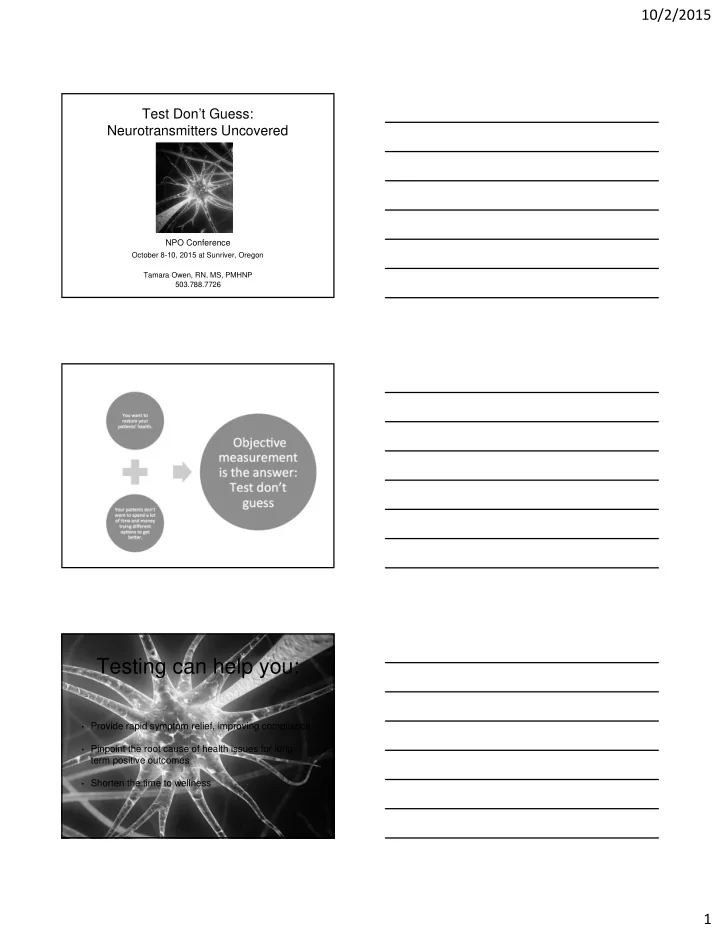

10/2/2015 Test Don’t Guess: Neurotransmitters Uncovered NPO Conference October 8-10, 2015 at Sunriver, Oregon Tamara Owen, RN, MS, PMHNP 503.788.7726 Testing can help you: • Provide rapid symptom relief, improving compliance • Pinpoint the root cause of health issues for long- term positive outcomes • Shorten the time to wellness 1
10/2/2015 www.tamaraowen.com 503.788.7726 Understanding the role of neurotransmitters and key players Inhibitory Neurotransmitters • Serotonin: mood, appetite and sleep • GABA: primary inhibitory neurotransmitter - necessary to feel calm and relaxed • Glycine: like GABA, helps to calm and relax the body • Taurine: important for proper heart function, healthy sleep and promoting calmness 2
10/2/2015 Excitatory Neurotransmitters • Epinephrine (Adrenaline): important for motivation, energy and mental focus • Norepinephrine (Noradrenaline): important for mental focus, emotional stability and endocrine function. • Dopamine: responsible for feelings of pleasure and satisfaction, also muscle control, muscle function, and GI issues. • Glutamate: primary excitatory neurotransmitter necessary for memory and learning. • PEA (phenylethylamine): important for focus and concentration. • Histamine: helps control sleep-wake cycle, plus energy and motivation. Cortisol and DHEA • Cortisol: primary glucocorticoid produced by the adrenal gland. Regulates body’s stress response. • DHEA: produced by the adrenal glad and is a precursor to estrogens and androgens. Why Test? Patients may present with the same complaint, but associated imbalances differ. (Anxiety Illustration) 3
10/2/2015 Treating a patient’s specific imbalances provides symptom relief, improving compliance. (Fatigue illustration) Results also provide insight into the root cause of symptoms, shortening the time to wellness and reducing costs (Insomnia illustration) 4
10/2/2015 Addressing the root cause allows you to fully restore balance and health Root Causes/ Contributors Physical Psychosocial Exposures to Hormonal Stress Stress toxins Shifts Persistent Emotional Poor diet, immune Stress medications activation Assessment and Testing Hormone and HPA axis and Inflammation/ neurotransmitter neurotransmitters Oxidative Stress interactions Toxins Genetics Lyme’s Disease Stress - the primary contributor Hypothalamic-pituitary-adrenal axis 5
10/2/2015 impacts adrenal output…but it isn’t just about DHEA and c How can we effectively assess adrenal function? 6
10/2/2015 Stages of Adrenal Dysregulation Normal Stress Response Compensation Mechanism 7
10/2/2015 Biomarkers for Early Stage Biomarkers for Early Stage Biomarkers for Mid Stage 8
10/2/2015 Biomarkers for Mid Stage Biomarkers for End Stage Biomarkers for End Stage 9
10/2/2015 Case Review 49 year old male: • Low energy • No motivation • Some anxiousness • Levothyroxine 75mcg Adrenal results Neurotransmitter results 10
10/2/2015 Calming Neurotransmitters Stimulating Neurotransmitters Adrenal Results 11
10/2/2015 Patient Care Cycle Identify Imbalances for Personalized Patient Care Epinephrine, Norepinephrine, Dopamine, DOPAC, PEA, Glut 5-HIAA 4-point cortisol Inflammation/Oxidative Stress The Source of Many Clinical Conditions 12
10/2/2015 Inflammation underlies many clinical conditions Inflammation is the body’s response to an immune challenge The nervous, endocrine, and immune systems are intricately interconnected. 13
10/2/2015 Inflammation affects other systems of the body and leads to clinical conditions Inflammation contributes to neurotransmitter imbalances Oxidative Stress is a byproduct of inflammation 14
10/2/2015 Consequences of inflammation and oxidative stress Low grade inflammation leads to: Case Review 23 year old male: • Low energy • No motivation • Some mood issues 15
10/2/2015 Adrenal Results Neurotransmitter Results: Inflammation Calming Neurotransmitters 16
10/2/2015 Stimulating Neurotransmitters Adrenal Results Sex Hormone Interactions with Neurotransmitters 17
10/2/2015 Sex hormones and neurotransmitters impact each other Estrogen and Serotonin Estrogen/Serotonin Connection 18
10/2/2015 GABA and Progesterone GABA/Progesterone relationship Progesterone and monoamine oxidase 19
10/2/2015 Dopamine and testosterone Dopamine/Testoterone Relationship Therapy considerations 20
10/2/2015 Toxins and Heavy Metal Exposure on the Nervous, Immune and Endocrine Systems Symptoms of metal hypersensitivities 21
10/2/2015 Occupations and industries with high metal exposure Sources of metal exposure: Frequency of Metal Sensitivity 22
10/2/2015 Many patients are sensitive to more than one metal Dental fillings (amalgams) Medications can contain metals 23
10/2/2015 Smoking tobacco products Jewelry Cosmetics 24
10/2/2015 Cosmetics Food Occupational exposure 25
10/2/2015 Sources of metal exposure: Comprehensive assessment yields the most data Test: • Neurotransmitters • 4-point cortisol • Sex hormones www.tamaraowen.com 503.788.7726 26
Recommend
More recommend